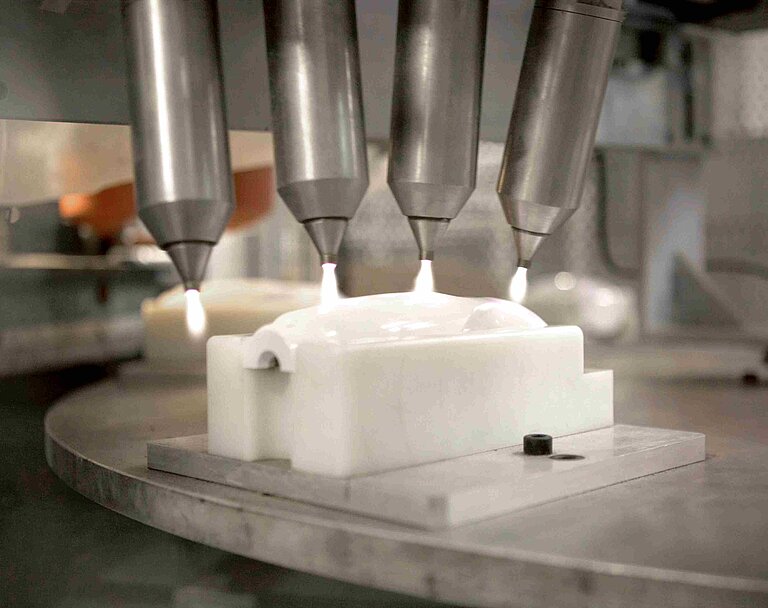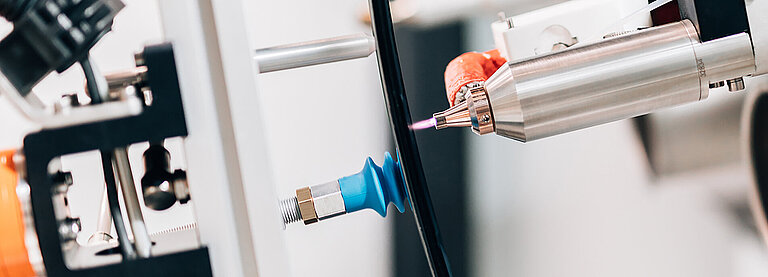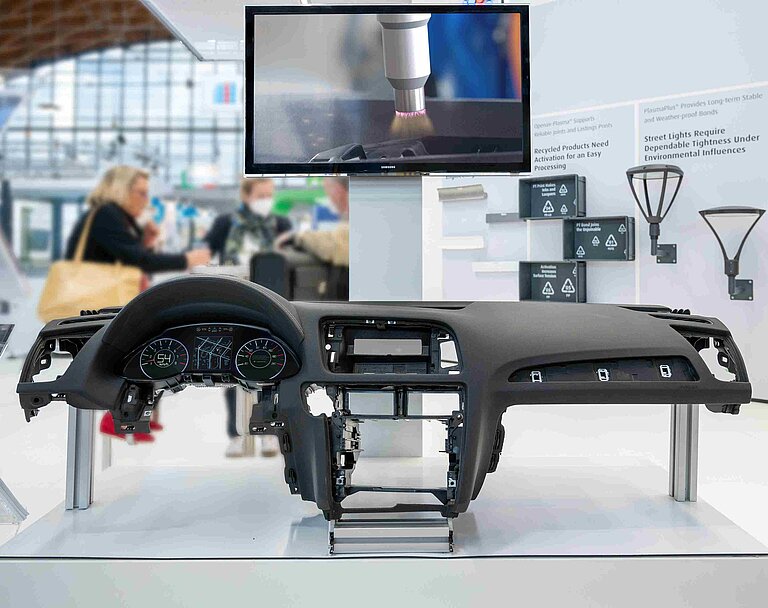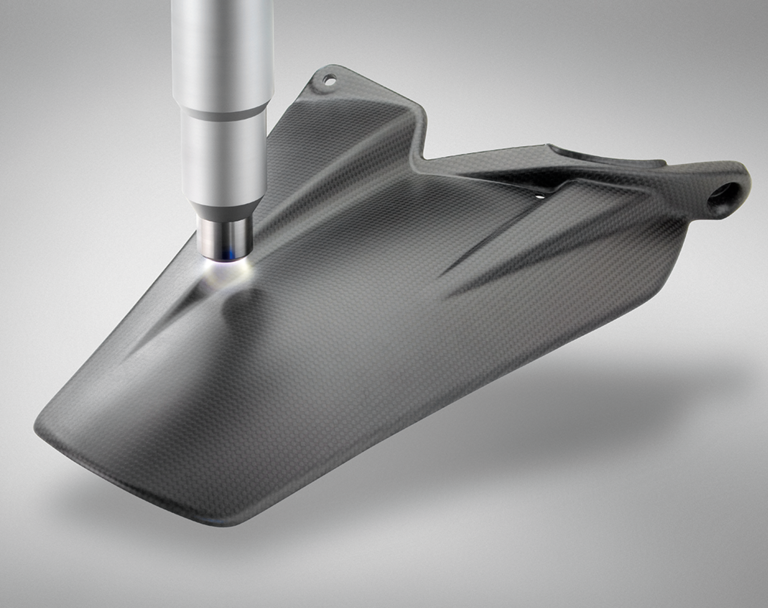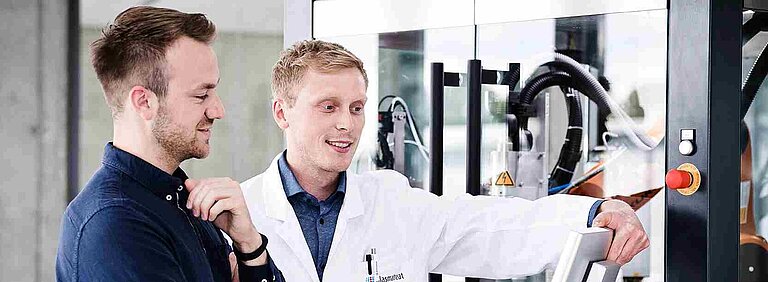
Game Changer Openair-Plasma® - live at Fakuma 2024
Explore the remarkable capabilities of this eco-friendly and highly efficient technology.
Game Changer Openair-Plasma® - live at Fakuma 2024
Learn how plasma treatment can significantly enhance outcomes in bonding, printing, painting, coating, and gasketing processes.
Get in touch with us directly
Why should you take a closer look at plasma technology?

Did you know that atmospheric plasma technology is the optimal solution for treating and processing plastics? Plasma specifically modifies the surface properties of this non-polar material. The result is an activated, polarized surface that can be easily printed, bonded, painted and sealed. This adaptation opens up completely new material possibilities and enables the use of solvent-free coatings and adhesives, increases process efficiency and helps protect the environment. In addition, previously incompatible materials can be combined, resulting in innovative material composites.
Plasma, as the fourth state of matter -besides solid, liquid, and gas-, offers numerous advantages:
- Environmentally friendly: Our production is VOC-free and the technology is CO2-neutral
- Gentle and effective: Improved surface properties, even with recycled plastics
- Advanced material selection: New opportunities for material substitution
- Quality and reliability: Increased end product quality and customer satisfaction
Learn more at our booth. Visit us at booth 1210 in hall A1 and see for yourself!
Or read on and find out what exactly happens during plasma treatment, and how is it applied in the industry.
You can't make it to the fair? Get in touch with us here!
Live on stage: Openair-Plasma® treatment and subsequent tape application
How plasma treatment works and how the treatment affects plastic surfaces, e.g. when a tape is applied afterwards - all these questions and more will be answered at Plasmatreat in Hall A1 on Stand 1210. First of all, the plasma experts will be demonstrating on the live plasma table how test specimens made of various plastics, such as PP and PE, but also ABS, are activated. At the same time, visitors can have the technology and the effect of plasma surface treatment explained to them. They will then have the opportunity to apply a tape to test specimens on the automated demo system from partner Glaub Automation and prove the effectiveness of the treatment with Openair-Plasma® using various tests. Glaub Automation offers various application heads, with which adhesive tapes (single-sided or double-sided adhesive, with liner or without), pads and foams can be applied fully automatically. Manufacturers appreciate the precision, repeatability and flexibility they get with Glaub Automation systems.


Demonstrating injection molding in a different way: HoliPress 16 manual plastic injection molding machine
Injection molding will not be neglected at Plasmatreat this year either: with the manual plastic injection molding machine HoliPress16 from partner HoliMaker, test specimens made of PP will be activated on one side with Openair-Plasma and then overmolded with TPU. Visitors will be able to see for themselves the adhesive strength of the TPU on the PP sample. HoliPress enables the production of high quality, functional prototypes and small series, requiring very small quantities of test material and standardized injection molds.
Openair-Plasma treatment can be used on both small and large injection molding machines, automated in the process or even inline in the injection molding process. In the in-mold plasma process, the plasma nozzle is integrated into the mold. Plasma flows through the channel via an activation channel and integrated exhaust, activating the molded part.
2 in 1 - Plasma treatment and printing of PP live at Plasmatreat
In cooperation with partner DJM, visitors to the Plasmatreat stand will be able to see how PP luggage tags are treated prior to printing. The entire surface of the plastic tags will be treated with Openair-Plasma® and then printed with UV-curing ink. This rotary nozzle can be used to pre-treat small areas of the surface to increase the adhesion of inks, paints or adhesives. The system includes a generator that is compact and easy to use. Interested parties can meet with Plasmatreat's experts to have their luggage tags printed and see for themselves the effectiveness and functionality of plasma treatment.


New Plasma System for the EPDM Market
Another system on stand 1210 in hall A1 will demonstrate the automated plasma treatment of EPDM door profiles. The system features a compact design. The door profiles are activated with several static nozzles and prepared for the subsequent application of VOC- and solvent-free adhesives and coatings in the form of flock or bonded coatings. Plasma technology also offers significant process advantages for this application. Thanks to the number of nozzles, the profile can be pre-treated selectively or over its entire surface. Conventional pretreatment methods such as mechanical brushing or primer application are completely replaced by this plasma system. This allows manufacturers to increase the level of automation and reproducibility of the pre-treatment process in production, while reducing their carbon footprint.
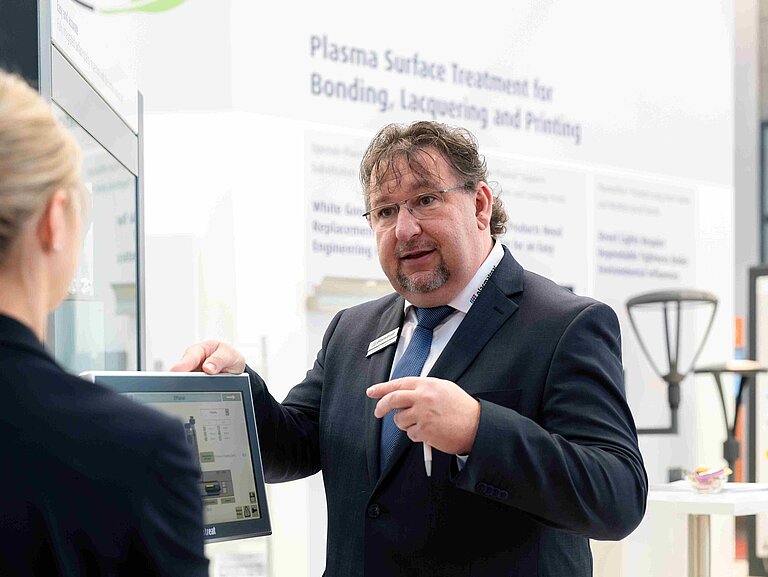
With our plasma processes, we can replace old process and greatly reduce the CO2 footprint in the production process.
The sustainable solution for bonding, coating, painting, lacquering, and printing
Visit our booth and learn how plasma works as an efficient and environmentally friendly alternative in industrial applications:
- Openair-Plasma® is used to introduce oxygen- and nitrogen-containing groups into non-polar plastics to increase the surface energy.
- This activation makes previously unreactive materials ready for further industrial processing.
- It increases surface wettability and thus adhesion, which improves the adhesion of adhesives, coatings, and the printability of materials.
- PlasmaPlus® technology is available for materials that require more than activation. Here, functionalized surfaces are created in a targeted manner.
- With plasma applications, the plastics processing industry significantly expands its range of materials and can even combine previously incompatible plastics.
Plasma: How Does this Exactly Work?
Openair-Plasma® is generated with electricity and compressed air and is even CO2-neutral when green energy is used. All plasma processes are solvent-free, contribute to the environmental balance, can be used site-selectively and can be seamlessly integrated into existing production lines.
Innovative control and monitoring systems from Plasmatreat ensure high process reproducibility. Dry surface treatment with Openair-Plasma® can be carried out in a fully automated process, as an environmentally friendly alternative to harmful chemical processes. Here, the need for additional pre-treatments with chemical primers is eliminated during the activation and fine cleaning of various surfaces prior to bonding, coating, painting, or sealing. Modern, solvent-free or water-based adhesives, paints, and varnishes can then be used.
This significantly reduces the emission of volatile organic compounds (VOCs) in production.


Plasma Instead of Chemicals
Using Openair-Plasma® means protecting the environment. Adhesion is really all about surface energy and surface polarity. Since nonpolar materials, and recycled materials, too, in many cases, are often difficult to wet, solvent based adhesion promoters are used to activate the surface. Consequently, adhesion promoters are frequently responsible for over 80% of the VOC-emitting substances used to achieve a reliable bond. Plasma based surface pretreatments achieve clean, highly activated surfaces which can be readily wetted with water, thereby dispensing with the need for VOCs and the associated drying and waste water disposal.
The gentle action of the plasma illustrates just what environmentally friendly adhesive processes can achieve: Structural adhesive bonds in the automotive industry, seals for electronics applications or quick, bubble-free wet labeling with high initial strength for the packaging industry – Openair-Plasma® combined with modern, solvent free adhesives can make all this possible without generating any chemical waste. The high surface energy generated by Openair-Plasma® ensures even paint distribution and optimal adhesion. Surface contamination resulting from organic impurities is safely removed. Plasma overwhelmingly reduces the reject rate in countless installations.
Substitution of materials
Openair-Plasma® enables targeted surface modifications to plastics to improve the adhesion of adhesives, paints, and coatings in industrial applications and even to bond materials together that were originally incompatible.
This opens up the possibility of expanded material selection. For example, high-cost engineering plastics can be replaced with lower-cost alternatives, reducing not only your material costs, but also energy consumption, as these alternatives can be manufactured using less energy.
Current applications from Plasmatreat's portfolio show how the use of low-cost polypropylene (PP) as a replacement for Acrylonitrile Butadiene Styrene (ABS) not only offers economic advantages, but also has a positive impact on the environmental balance.
We are Ready for Your Challenges
Thanks to our global network of sales, service and partners, we can support you wherever you are. Thanks to our expertise and experience, we are ready to help you meet your needs in the field of specialized surface treatment.
Do you have further questions that require a detailed explanation? Book your live appointment at Fakuma 2024 now, or use our contact form at the bottom to get in touch directly with our surface treatment experts.

Our worldwide Sales and Service is there for you - where ever you are!
With our network of research and development centers, subsidiaries and commercial agencies around the world, we are always present wherever our expert knowledge and experience in the field of individual surface treatment is in demand. We offer you local and individual support in your time zone and language. This ensures that our advice is focused on your challenge, that we understand it and that together we find a solution that is tailored to your individual needs.
You can't be at the trade fair but still want to test the effect of plasma on your own materials? Our Book-a-Demo makes it possible!
Book a customised live demonstration, follow the handling and plasma treatment of your sample, get answers to your specific questions, see what plasma can do and find the best solution for your application together with our plasma experts near you.

